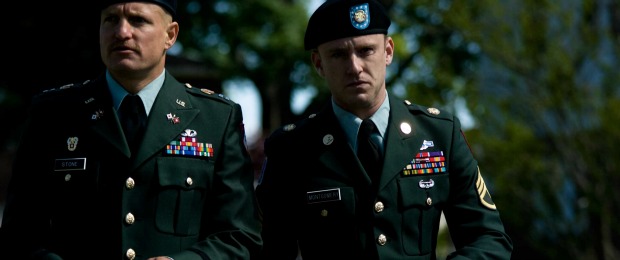The Messenger
The Messenger dwells upon a unit of the military that usually only makes cameo appearances in other films.
Plot summary
An American soldier struggles with an ethical dilemma when he becomes involved with a widow of a fallen officer.

Staff Sergeant Will Montgomery (Ben Foster) has been injured in conflict. Serving out his final few weeks before he’s able to leave the army, he’s given the unenviable task of joining the Casualty Notification Office back at home in the US – where he has to partner Captain Tony Stone (Woody Harrelson) in notifying next of kin that their loved ones have been killed during military operations. It’s a challenging, thankless task, and the older soldier tutors the undisciplined and moody younger man in the correct protocol of the job. Slowly, a respect and friendship grows between the men.
However, the bond is tested when Montgomery finds himself drawn to Olivia (Samantha Morton). Olivia’s husband has been killed overseas, and Montgomery and Stone are the ones who must inform her. It is strictly against protocol for the younger soldier to become romantically entangled with the vulnerable widow, but – recovering from his own dose of rejection and heartache – Montgomery finds that he can’t stay away from her door.
The Messenger dwells upon a unit of the military that usually only makes cameo appearances in other films. Given the popularity of reality TV, and how audiences hunger for raw, naked emotions, you’d think there would be something morbidly magnetic about watching people being informed that their loved ones have been killed. However, any such curiosity – as sensitively and authentically handled here – soon turns to discomfort. There is nothing entertaining about watching the families experience such sorrow. All involved with The Messenger are to be applauded for depicting this most horrific of scenarios without sensation. Director and co-writer Oren Moverman has also drawn gritty performances from his three leads, and it’s notable that Harrelson was nominated for an Academy Award for his performance.
Why, then, was The Messenger only given an extremely limited release in the US back in 2009, and it’s only now reaching these shores? Partly because stories depicting the reality of life in the army rarely go down well with the multiplex masses, who seem to prefer their military flicks to offer a surplus of explosions and hi-tech hardware. Although The Messenger is not the first film to highlight the fact that soldiers die in conflict, few others have dwelt so painfully on the ramifications for those left behind at home. It’s a challenging film, and – at times – a hard-going one. The pace is slow, and the main characters are – to one degree or another – damaged and dealing with their own demons. Although an original tale, many will find the end results overbearingly claustrophobic and sombre.











COMMENTS